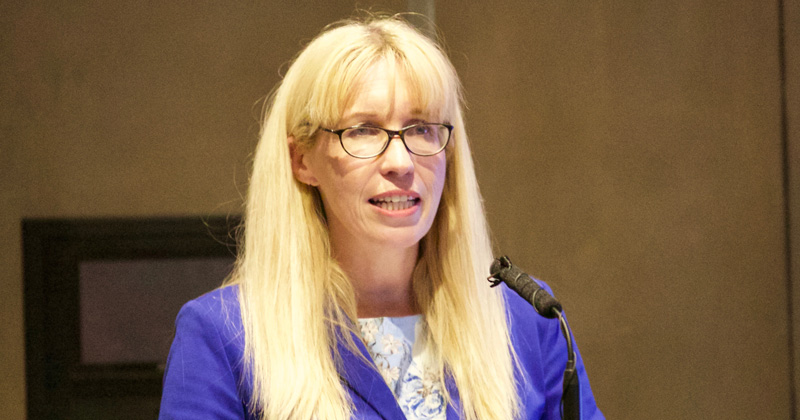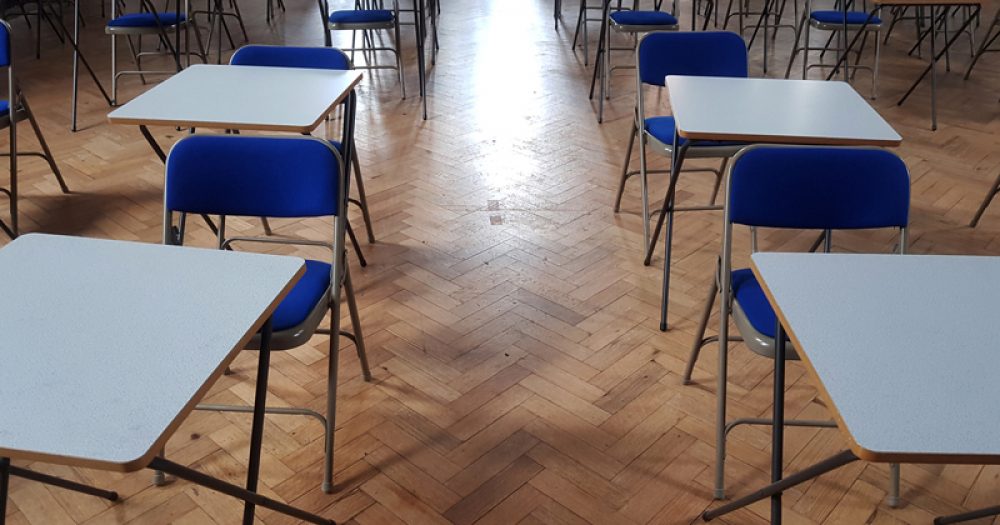The government has promised that no pupil will be disadvantaged by the cancellation of exams. But a new study shows that thousands of youngsters in turnaround schools will indeed be penalised. Schools Week investigates.
“Kids have given up their weekends, we’ve had holiday interventions, 7.30am revision sessions, teachers teaching until 7pm,” says Elroy Cahill, headteacher of Kingsley Academy, in Hounslow. “The kids have really grafted.”
After taking over in February last year, Cahill has overseen a rapid transformation, including a huge change in staff (92 per cent of the year 11 teachers were new in September).
The school was predicting its modelled progress 8 would rise from -0.62 to +0.93, marking it as one of the “most transformed schools in the country”.
Children will be stuck with the outcomes the school has had historically
In English language, for example, 31 per cent of pupils got a grade 4 or above last year. This year the school was predicting 70 per cent of pupils would reach the same level.
But then came coronavirus. And exams were cancelled.
The government has said its “priority will be making sure no pupil is disadvantaged by the cancellation”. But for rapidly improving schools, such as Kingsley, that promise rings hollow.
This year teachers will be asked to submit grades for what they expect their pupils would have achieved.
However, those grades will then be standardised by exam boards, based on the pupil’s prior scores at primary school and the school’s historic results.
Ofqual, the exams regulator, won’t take into account rapid improvement made this year. That wipes out the hard work of Kingsley’s staff and pupils.
“We’re a different school from two to three years ago, but those children will now be stuck with the outcomes that the school has had historically. These kids should have been getting 6 and 7s,” Cahill said. “It’s just awful.”
A study by SchoolDash suggests more than 5,000 year 11s in rapidly improving schools face losing out this year.
An analysis of results in 2019 found 15 schools – representing 1,600 year 11 pupils – showed year-on-year improvements of 0.8 of a grade, on average, or more in their Progress 8 score.
A total of 45 (1.4 per cent of all the schools in the country), representing 5,400 year 11s, made improvements of 0.6 of a grade or more.
The schools most likely to have improved (and now losing out) are disproportionately those with low prior progress 8 scores and low Ofsted ratings – and with a new leadership.
The SchoolDash research was commissioned by the Academies Enterprise Trust (AET). It was concerned about how the grading system this year would affect rapidly improving schools such as Kingsley, an AET school.
At Avonbourne Boys’ Academy, in Bournemouth, just 22 per cent of pupils got a grade 5 or above in English last year. The academy’s moderated centre-assessed grades predicts “very significant” rises for the boys’ results to 45 per cent.
United Learning took on the school last year with the Avonbourne Girls’ Academy, which has slighter higher historic outcomes.
Both cohorts have since been merged and taught by the same staff and in the same classes for the most part of the year. This will leave the trust able to see any negative impact the Ofqual model has on the boys’ performance due to their school’s historic lower performance.
A United Learning spokesperson said while Ofqual had a “fundamentally impossible job”, children in “fast-improving schools will suffer detriment if Ofqual relies solely on its statistical model as the basis for awarding”.
Ofqual said putting too much weight on teacher-assessed grades was “likely” to produce results that were “overall too lenient”, so its approach put more weight on the statistical expectations.

But the United Learning spokesperson added: “If centre assessment grades are not used as a core part of Ofqual’s model, they will be unable to get results right in schools where past performance is not an accurate guide to current performance. Students’ results this summer will depend solely on the performance of a completely different group of young people, taught very differently.”
The Prescot School, in Knowsley, was predicting a -0.39 Progress 8 score this year, a huge improvement on the -1.17 of 2018.
David Donnelly, the chief executive of the Heath Family (NW) MAT that runs the school, said if results were moderated using a three-year average, then “the worst-case scenario for Prescot students is that they are disadvantaged by about half a grade a subject”.
When ruling out taking into account schools’ improvement trajectory this year, Ofqual pointed to its own research showing results in just 0.8 per cent of schools increased by more than the national average change in 2015 and 2016. Additionally, 0.5 per cent also had results that decreased by the national average in those years.
As well as the small numbers, it said the “lack of stability in improvements or deteriorations in performance would mean that, for the overwhelming majority of centres, a statistical model that reflected centre trajectory is likely to be unreliable in predicting trends in performance this year”.
The SchoolDash study challenges that. It found 11 schools that improved by at least 0.8 of a grade in 2018 – and all sustained or improved these increases into 2019. Of the 51 that increased by at least 0.6 in 2018, 40 (78 per cent) sustained them into 2019.
Timo Hannay, SchoolDash’s founder, said any moderation policy that did not allow for these effects “risk disadvantaging thousands of students.

“At least attempting to identify which schools are likely to have shown rapid improvement this year seems like the only fair thing to do.”
Bexleyheath Academy in London, also an AET school, is projecting a 20 percentage point rise on the 46 per cent of pupils who got a grade 4 or above in English and maths last year.
Graeme Napier, its head, said there had been an “intense focus” on year 11 and 13 pupils, with school running from 8am to 6pm.
“The pupils can see just how far they have come for that to be taken away. A proportion predicted a good pass will be stuck with 2s and 3s. They won’t hit the requirements for university. It will be heartbreaking for them.”
But can anything be done?
Napier said there should some way to take rapid improvement into account in such exceptional circumstances, highlighting that pupils in new free schools will be given grades without historic outcomes potentially weighting them down.
Cahill said such cases should have a right of appeal. He suggested panels made up of regional schools commissioners and serving and former leaders who could weigh up the evidence.
“If this system is about not disadvantaging kids, then this just flies in the face of that.”
But Leora Cruddas, the chief executive of the Confederation of School Trusts (CST), said the solution lay further up the chain.
“It is very important that universities, sixth-form settings and employers give additional latitude. In this year more so than in others, it is important to give students the benefit of the doubt and take a broad approach to evidence.”
Ofqual said its standardisation process would ensure higher education institutions and employers could “have confidence” in this year’s results.
A spokesperson said: “The exceptional arrangements in place this summer are the fairest way of giving as many students as possible the opportunity to progress, despite the cancellation of exams.”
But this will do little to console pupils in schools such as Kingsley.
“We’ve done a huge amount to build up the trust of our community again, a community the school had failed in the past,” Cahill said. “But they will see the kids have got results that fall well short of what the school has been saying. They won’t blame Ofqual, they’ll see it as another example of the school failing them.”
Ofqual won’t reveal standardisation model for new free schools
Ofqual won’t say how it will standardise grades submitted by new free schools who have their first cohort getting results this year.
Teacher-assessed grades will be checked against schools’ results from previous years to ensure they aren’t too generous.
However, any improvements made this year won’t be taken into account.
Aggrieved school leaders of turned-around schools have said Ofqual must have a process for standardising results by not including a school’s prior outcomes, highlighting new free schools who have their first cohort getting results this year.
When asked how results for these schools will be moderated, Ofqual claimed some schools are still to submit their teacher-assessed grades, despite the deadline being nearly a month ago.
They added: “Until that is complete, it would not be fair to publish detail which might influence those submissions for a small number of centres. We will be saying more in the coming weeks about how the standardisation model works.”
Unity Howard, director of New Schools Network, said it’s “essential” new free schools “are not penalised by the blanket approach that has been proposed. Ofqual are aware of our concerns and we are hopeful this will be resolved so that students get the results they deserve.”








It’s funny how, in the year where there’s no external examinations, so many schools are predicting record breaking exam results. The school calculated P8 scores of so many schools will be astronomically high. It’s a good job there’s a process to protect the validity and fairness of centre based grades – especially for schools such as mine who are consistently in the top 5% of schools nationally for GCSE outcomes (irrespective of Covid 19).
Which is great Phil for so many schools. However schools like Kingsley, will be unfairly disadvantaged. Since joining in March 2019, we’ll have 90% new staff including 100% new SLT, majority of our new staff came with track records of phenomenal impact and outcomes in previous schools, and a new curriculum. Ofsted recognised the change grading the school ‘Good’ for the first time in our history. Last year over 50% of staff were supply, as had been the case for the last 3 years. Over 70% of our students don’t have KS2 data, so Ofqual’s method of standardisation, I agree will work for most schools, such as yours but not for all. It is unfair and limits the life chances of students at schools like ours. A one size fits all approach won’t work. I know 100% that some schools would try to ‘play’ the system but also know 100% that if a fair appeal process existed for schools that Kingsley’s evidence base is so secure that our CAG grades would stand.
“Statistical standardisation” (whatever that is!) is taking place right now, so it’s hard to see how the algorithm can be changed – that might be possible, but no one knows.
What might be possible, though, is to get the appeals process changed, for example, to make it like Scotland’s – where appeals will be free, and allow for “further, evidence-based consideration of grades if schools and colleges do not think awarded grades fairly reflect learner performance”.
Although this is the last-chance-saloon, at least that last chance should be there.
So how can pressure be exerted on Ofqual to change their mind?
Through your MP? Through the Select Committee? Through ASCL, NAHT, HMC, the unions… truly acting in concert? Through social media? Through The Student Room?
Don’t just read this! Do something!!!
https://www.tes.com/news/we-need-act-now-make-sure-gcse-grades-are-fair?fbclid=IwAR36KtQQg0Wk7UobUI4Gs32VkDP5DcLCt_HPAjX8xg1g254IfPAaYlZZfNo
Some 2017-2019 A-level results from my son’s school of 1100 students:
Chemistry: A* and A rates fluctuated from 0% to 9% and 20% to 36% respectively
Physics: A* and A rates fluctuated from 10% to 33% and 20% to 32% respectively
Further Maths: A* rate fluctuated from 0% to 40%
English Literature: A* rate fluctuated from 5% to 30%
Psychology: A rate fluctuated from 0% to 50%
Economics: A rate fluctuates from 7% to 21%
French: A* rate fluctuated from 0% to 100%
No statistical modelling can use this data to “standardise” the school’s A* and A rates at A-level. This will affect hundreds of similar schools across the country.
Phil,
If your school’s performance in a subject is consistent, eg, each year around 10% get grade 9 in Physics, then statistical modelling makes sense because if this year the school predicts double that rate then its reasonable to be suspicious and the statistical model has a reasonable chance of predicting reliably.
However, if another school averages 10% A* Physics A-level from 2017 to 2019, but the numbers are smaller and the rate fluctuated from 5% from 30%, there is a higher chance of the statistical model getting it wrong.
Young people are paying the price for the axing of coursework. That said, now is the time to reduce the emphasis on exams at 16 and move towards graduation at 18 via multiple routes. (If I say it often enough, it may happen eventually)